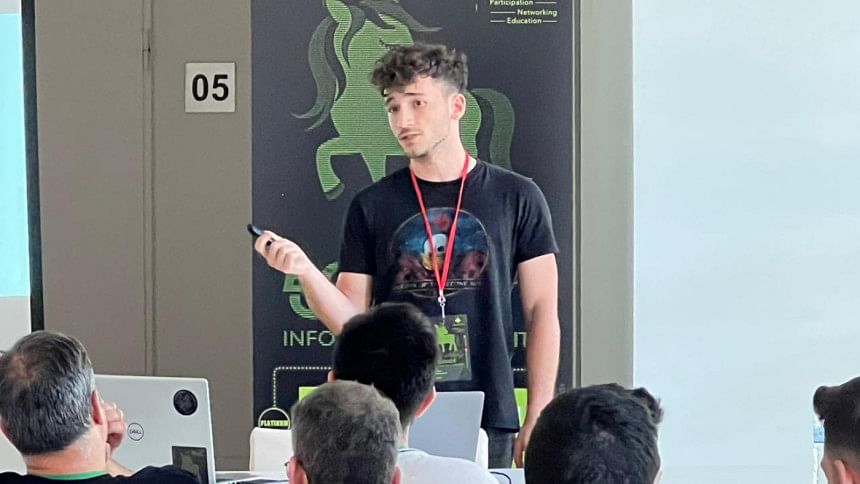He uncovered a massive data leak in Bangladesh. Here's what he says on cybersecurity

Viktor Markopoulos, a cybersecurity expert from Bitcrack Cyber Security, made headlines for uncovering a colossal data breach in Bangladesh. His discovery, which revealed the personal data of millions from a government website, not only shed light on severe security oversights but also sparked a nationwide dialogue on the urgency of data protection and privacy.
For countries like Bangladesh, cybersecurity is quickly becoming a central concern. In an exclusive interview, we dive into the dynamic world of cybersecurity with Viktor Markopoulos, who shares his experiences, hurdles, and perspectives on the evolving landscape of cybersecurity, especially in the context of Bangladesh and developing nations.
What inspired you to pursue a career in cybersecurity, and what have been some of the most significant challenges you've faced?
My fascination with computers was the main driving force behind my career choice. I explored various paths in computer science engineering before finding my true calling in cybersecurity. The biggest challenge in this field is the relentless need to stay updated. The technology world is ever-evolving, and you're constantly learning. Keeping pace with the latest techniques and trends is both demanding and crucial.
Can you share with us your journey in the field of cybersecurity and the key milestones of your career?
I began my cybersecurity journey in university, learning more through contests and challenges. Then, I delved into bug bounties and disclosure programs, where identifying system vulnerabilities could lead to rewards. A significant milestone was being invited to a live hacking event for top security specialists. This field excites me, and finding a job I genuinely enjoy while growing, exploring, and increasing security measures has been a pivotal part of my journey.
How do you see the global landscape of cybersecurity evolving, and what trends should we be most aware of?
Cybersecurity is becoming vital in every technological aspect, especially with the rise of IoT and industrial systems. The threat landscape has grown immensely recently, with various groups targeting vulnerable systems and individuals. It's essential to be aware of these evolving threats to stay ahead.
From your expertise, how would you assess the current state of cybersecurity in Bangladesh?
Like many other nations, it's quite impossible to remain a hundred percent safe from cybersecurity attacks. However, in Bangladesh, I have noticed that when organisations there recognise an issue, they act quicker than in some other places. There's room for improvement, but the responsiveness is a positive sign.
How does Bangladesh's cybersecurity infrastructure compare to other countries you have experience with?
Like many countries, Bangladesh faces vulnerability risks, especially when decentralising security. Staying updated and proactive is critical for any country's cybersecurity health. However, I have observed Bangladesh's authorities taking action faster than many countries. The future for Bangladesh looks bright in cybersecurity as long as the leaders remain conscious of the vulnerabilities and act swiftly on them.
What are the areas where Bangladesh could improve its cybersecurity measures?
In my experience, critical data exposure is an issue not just in Bangladesh but globally. Improving authorisation protocols, regular system maintenance, implementing more robust firewalls, and timely patching are crucial for enhancing cybersecurity.
What role could the Bangladeshi government play in enhancing national cybersecurity?
As the first line of defence, the Bangladeshi government has a pivotal role in strengthening our national cybersecurity. By implementing comprehensive cybersecurity regulations similar to Europe's GDPR, they can significantly enhance security measures in both the public and private sectors. Such regulations would provide a robust framework for protecting data and deterring cyber threats.
How important is public awareness and education in cybersecurity for a country like Bangladesh?
Public awareness and education in cybersecurity are crucial, especially in a technology-driven world like ours. It's not only the government's job to safeguard data. We, as individuals, must be vigilant and informed to protect ourselves from cyber threats and scams. Educating the public on basic cybersecurity principles is essential for national security.
Looking back at your career, what advice would you give to young professionals aspiring to enter the field of cybersecurity?
I advise young professionals to focus on the journey, not just the destination. Cybersecurity is a field driven by passion and the constant need to stay ahead. Embrace every learning opportunity and remain curious. This endless pursuit of knowledge will make you successful in this ever-evolving field.
What is your opinion on the potential of cybersecurity career opportunities worldwide and in Bangladesh?
The potential for cybersecurity careers is enormous, both worldwide and in Bangladesh. With the rapid expansion of technology, especially with the integration of AI, the demand for skilled cybersecurity professionals is skyrocketing. I've witnessed incredible talent in Bangladesh, particularly during the bug bounty programs, which show vast potential in this region.
What is your opinion on AI's usage in cybersecurity? Do you see it as a friend or foe?
I definitely see AI as a friend in the realm of cybersecurity. It's a potent tool that can be leveraged for both defensive and offensive strategies. However, it's crucial to remember that AI can't replace the human element in cybersecurity. The intuition and expertise that humans bring to the table are indispensable.
Securing tomorrow: A vision for a safer digital world
Viktor Markopoulos' insights shed light on the dynamic world of cybersecurity. His journey underscores the necessity of continuous learning and the importance of adapting to emerging digital threats. Along with his keen observation of the potential the folks of our country hold in the cybersecurity arena, he stresses the crucial roles of government regulation, public-private collaboration, and public education in enhancing national cybersecurity.
For those aspiring to enter the cybersecurity field, his advice is to cherish the journey and stay curious. While there is still a lot of work to be done, Markopoulos views the future of cybersecurity with optimism, particularly in developing nations like Bangladesh. His perspective offers a blueprint for a safer digital future, for all.


 For all latest news, follow The Daily Star's Google News channel.
For all latest news, follow The Daily Star's Google News channel. 







Comments